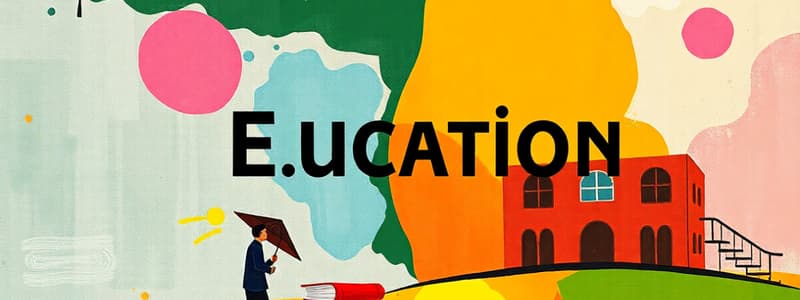Podcast
Questions and Answers
What is the primary characteristic of formal education?
What is the primary characteristic of formal education?
- It is organized without any specific curriculum.
- It occurs through media and personal experiences.
- It follows a structured curriculum overseen by authorities. (correct)
- It occurs in informal settings like homes or communities.
Which of the following best describes informal education?
Which of the following best describes informal education?
- It includes community workshops and vocational training.
- It is structured and overseen by educational authorities.
- It involves standardized testing and assessments.
- It occurs through life experiences and is unstructured. (correct)
What is the main goal of education?
What is the main goal of education?
- To promote personal development and lifelong learning. (correct)
- To ensure all students achieve perfect scores in assessments.
- To limit diversity in learning methods.
- To prepare individuals solely for academic careers.
Which term refers to the methods and practices of teaching?
Which term refers to the methods and practices of teaching?
What is a major trend in education that focuses on diverse learning needs?
What is a major trend in education that focuses on diverse learning needs?
Which educational level is primarily focused on basic literacy and numeracy?
Which educational level is primarily focused on basic literacy and numeracy?
What challenge in education pertains to the socioeconomic factors affecting learning outcomes?
What challenge in education pertains to the socioeconomic factors affecting learning outcomes?
Which educational theory emphasizes learning as an active, constructive process?
Which educational theory emphasizes learning as an active, constructive process?
Which option is NOT a purpose of education?
Which option is NOT a purpose of education?
What concept encompasses the subjects and content taught in schools?
What concept encompasses the subjects and content taught in schools?
Flashcards are hidden until you start studying
Study Notes
Definition
- Education: A systematic process of acquiring knowledge, skills, values, and beliefs through various methods.
Types of Education
-
Formal Education
- Structured and institutional (e.g., schools, colleges).
- Follows a specific curriculum and is overseen by educational authorities.
-
Informal Education
- Unstructured and non-institutional.
- Occurs through life experiences, media, family, and community.
-
Non-Formal Education
- Organized but outside the formal education system.
- Includes workshops, community education, and vocational training.
Purpose of Education
- Promote personal development and lifelong learning.
- Cultivate critical thinking, creativity, and social skills.
- Prepare individuals for employment and responsible citizenship.
- Foster cultural awareness and social independence.
Educational Systems
- Vary by country and can include different levels:
- Primary Education: Basic literacy and numeracy.
- Secondary Education: General or vocational education, often compulsory.
- Higher Education: Colleges and universities offering degrees and specialized training.
Key Concepts
- Curriculum: The subjects and content taught in schools.
- Pedagogy: The methods and practices of teaching.
- Assessment: Measurement of student learning and skills (tests, exams, projects).
Trends in Education
- Technology Integration: Use of digital tools and resources in teaching and learning.
- Inclusive Education: Ensuring accessibility for students with disabilities and diverse backgrounds.
- Lifelong Learning: Encouraging ongoing education throughout an individual's life.
Challenges in Education
- Equity in access to quality education.
- Balancing standardized testing and personalized learning.
- Addressing the impact of socioeconomic factors on educational outcomes.
Influential Theories
- Constructivism: Learning as an active, constructive process.
- Behaviorism: Focus on observable behaviors and reinforcement.
- Multiple Intelligences: Recognizing diverse capabilities among learners.
Importance of Education
- Empowers individuals with knowledge for personal and professional growth.
- Contributes to societal development and economic stability.
- Encourages informed citizenship and civic engagement.
Definition of Education
- Education is a systematic process of acquiring knowledge, skills, values, and beliefs.
Types of Education
- Formal Education is structured and institutional, following a curriculum with oversight by educational authorities (e.g., schools, colleges).
- Informal Education is unstructured and non-institutional, occurring through life experiences, media, family, and community.
- Non-Formal Education is organized but outside the formal education system, including workshops, community education, and vocational training.
Purpose of Education
- Promotes personal development and lifelong learning.
- Cultivates critical thinking, creativity, and social skills.
- Prepares individuals for employment and responsible citizenship.
- Fosters cultural awareness and social independence.
Educational Systems
- Vary by country and can include different levels:
- Primary Education: Focuses on basic literacy and numeracy.
- Secondary Education: Provides general or vocational education, often compulsory.
- Higher Education: Colleges and universities offer degrees and specialized training.
Key Concepts in Education
- Curriculum: The subjects and content taught in schools.
- Pedagogy: The methods and practices of teaching.
- Assessment: Measurement of student learning and skills (tests, exams, projects).
Trends in Education
- Technology Integration: Use of digital tools and resources in teaching and learning.
- Inclusive Education: Ensures accessibility for students with disabilities and diverse backgrounds.
- Lifelong Learning: Encourages ongoing education throughout an individual's life.
Challenges in Education
- Achieving equity in access to quality education.
- Balancing standardized testing with personalized learning.
- Addressing the impact of socioeconomic factors on educational outcomes.
Influential Theories in Education
- Constructivism: Views learning as an active, constructive process.
- Behaviorism: Focuses on observable behaviors and reinforcement.
- Multiple Intelligences: Recognizes diverse capabilities among learners.
Importance of Education
- Empowers individuals with knowledge for personal and professional growth.
- Contributes to societal development and economic stability.
- Encourages informed citizenship and civic engagement.
Studying That Suits You
Use AI to generate personalized quizzes and flashcards to suit your learning preferences.




